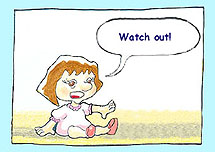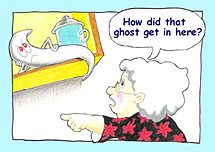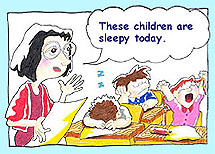Grammar: Sentence: Quoting and reporting speech and thoughts
| Quoting speech and thoughts |
Punctuating direct speech
In writing, direct speech is shown by using a pair of single or double 'quotation marks', also called 'inverted commas'. The beginning of the quotation is signalled by opening quotation marks and its end by closing quotation marks:
 |
Kitty called out a warning, 'Watch out!' Kitty called out a warning, "Watch out!" |
 |
Bozo thought, 'What's going on here?' Bozo thought, "What's going on here?" |
When the quoting clause precedes the quotation, the quoting clause ends with a comma or (less commonly) with a colon:
| Granny asked, "Can you get into this bottle?" |  |
| Granny thought: "How did that ghost get in here?" |  |
No matter whether you use a comma or a colon, the first word of the quotation is always written with an initial capital letter.
When the quotation precedes the quoting clause, it is the quotation which ends with a comma:
| "These children are sleepy today," Miss Lee thought. |  |
However, if the quotation itself ends with a question mark or an exclamation mark, then no comma is necessary:
| "How's this, then?" said the ghost, and quickly slipped into
the bottle.
"Very good!" said Granny, putting a cork into the mouth of the bottle. |
 |
| For information about some of the problems that students have with punctuating direct speech, click here: |  |
Tell me more ... Structure of direct speech |
|
||
To give us feedback about this section, click here or on the Comment button at the top of the screen.
If you have any questions about this section, visit the Language Corner.
If you have any questions or suggestions about how to teach this section, send a message to the Teaching Corner.